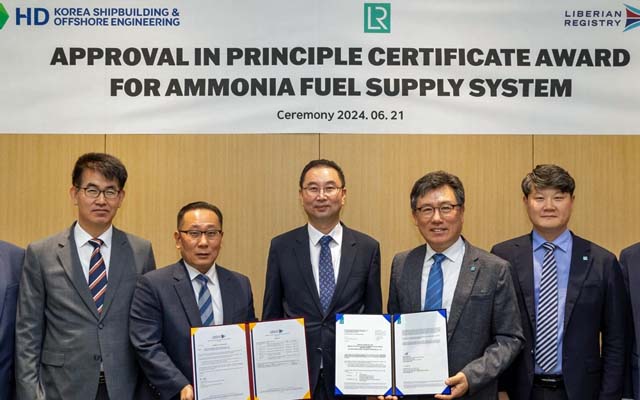Lloyd’s Register (LR) has granted Approval in Principle (AiP) to HD Korea Shipbuilding and Offshore Engineering (HD KSOE) for an ammonia fuel supply system, which will be used on ammonia-fuelled newbuild vessels.
The newly developed ammonia fuel supply system shows complete compatibility with high-efficiency cargo handling systems and ammonia engines. The approval certifies the fuel supply system against LR’s risk-based certification (RBC-1) process and marks the successful conclusion of a Joint Development Project (JDP) between LR and HD KSOE, which began in April 2024. The primary objective of the JDP was to develop and refine the design concept of an ammonia fuel supply system for ammonia-fuelled vessels. The AiP represents the substantial step that LR and HD KSOE have taken towards pioneering innovative solutions for emission reduction in the maritime industry.
Ammonia, with its capacity to meet the rising demand for emission reduction solutions, represents a promising alternative fuel for the maritime industry. This fuel supply system addresses the pressing need for sustainable fuel solutions, significantly contributing to efforts aimed at reducing greenhouse gas emissions from the global fleet.
Young-Doo Kim, LR Global Technical Support Office Representative, Korea, said: “This approval in principle represents another significant step for developing the technology required for shipowners and operators’ adoption of ammonia, one of the primary candidate fuels for the maritime energy transition. We are pleased to continue our strong working relationship with HD KSOE through this joint project that will provide a valuable solution for ammonia propelled ships.”
Young-jun Nam, VP and COO, HD KSOE said: “Ammonia is a zero-carbon fuel that is attracting great attention in terms of economics and supply stability. HD Korea Shipbuilding and Offshore Engineering will lead the field of eco-friendly equipment and materials to take the lead in commercialising ammonia in 2025.”
Image: HD KSOE’s ammonia fuel supply system receives first AiP (source: Lloyd’s Register)



